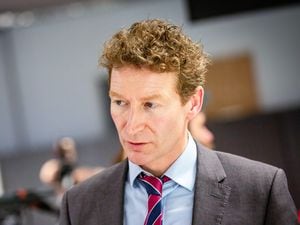P&R still considering a higher income tax rate
Debate is continuing inside the Policy & Resources Committee about whether to propose an increase in income tax as part of the States’ next annual budget in November.

The new senior committee was widely expected to avoid significant moves on tax, following its election with only 18 months left of the current States’ term, and in the aftermath of the previous P&R repeatedly failing to get major tax reform through the States Assembly.
But P&R president Lyndon Trott, who unsuccessfully proposed income tax rises to the States shortly before his promotion to the top job last year, has revealed that he was still hopeful of winning his committee’s backing for a new rate of 22p in the pound.
Asked if his committee agreed with him, he said: ‘I’m not yet sure that the majority do, but I’m also not sure yet that the majority don’t, so I can’t be certain where we will rest on this.
Listen to the full interview with Lyndon Trott on the latest Guernsey Press Politics Podcast
‘What I can say is that, if I had my way, I would test this with the States. It would be a very difficult time to do it because it would be the last budget before an election.’
Deputy John Gollop, also now a member of P&R, seconded Deputy Trott’s earlier proposal to increase the standard rate of income tax from 20% to 22% or 23%.
The committee’s vice-president, Deputy Heidi Soulsby, has previously suggested higher income tax bands for higher earners.
But its remaining members, Jonathan Le Tocq and Bob Murray, have previously expressed less enthusiasm for putting up income tax.
Treasury officials have estimated that raising income tax by 1p in the pound would generate another £16m. a year.
In February, the Isle of Man increased its rate of tax on most income from 20% to 22%, as a temporary move while a new health tax was developed.
The States rejected a similar proposal by 30-10 in October, but Deputy Trott believes there could be a majority for it if his P&R got behind the idea this year.
‘I’ve got slightly more faith in my colleagues than some of my predecessors,’ he said.
‘I think they are capable of making that harsh decision. There is only a handful of States members who don’t accept that we simply don’t take enough tax from our output.
‘I’m hopeful that my colleagues will support that initiative. If they don’t, at the very least I shall use the next year to continue to make the case for why, if you don’t go for a consumption tax [GST], and I completely understand the concerns, then you really only have one legitimate alternative and it is personal tax.’
P&R remains under a States direction to recommend changes to reduce costs by between £10m. and £16m. a year.
Deputy Trott argued that the outstanding difference in Guernsey was the relatively low amount of tax collected expressed as a percentage of the size of the island’s economy.
‘It is materially less on a per capita basis than our colleagues in Jersey, and even more materially less on a per capita basis in the Isle of Man,’ he said.
‘We’re at the bottom of the table. We’re at the bottom of almost every table.
‘That’s why it remains such a challenge, particularly with the cost of health care continuing to rise.’





